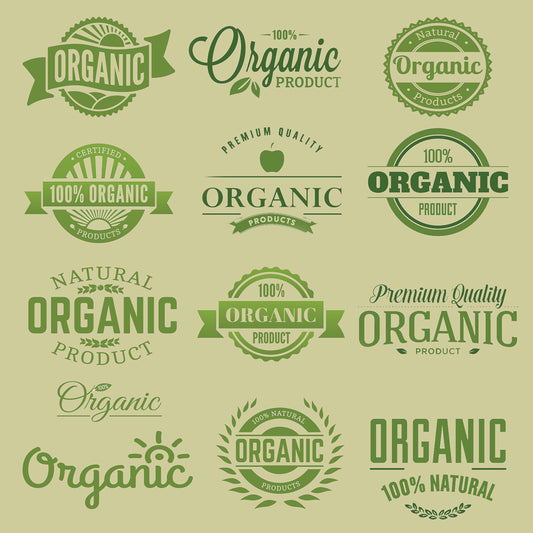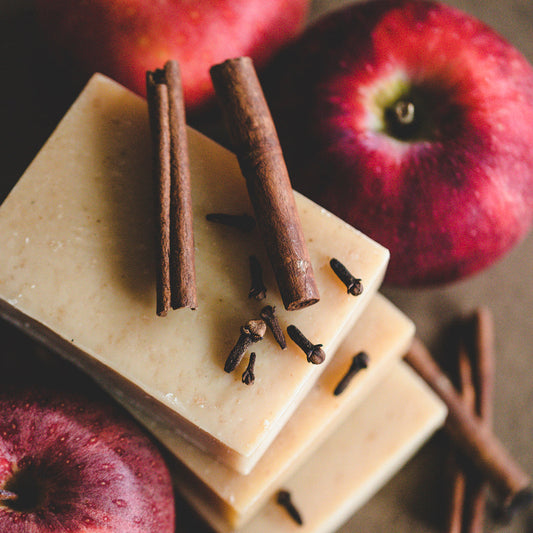"Organic" Soap and Shampoo Bars
More and more consumers are choosing personal care products made with natural or organic ingredients.
 As a result the word “organic” is currently one of the most popular terms to include on products.
As a result the word “organic” is currently one of the most popular terms to include on products.
Corporations know that using lovely herbs and the word “organic” on labels and marketing materials immediately makes a product much more appealing to consumers looking for natural alternatives for their families.
This consumer preference presents a perfect opening for exploitation.
As you peruse the internet, local markets, or drugstores, do not be tempted by labels promising organic soap. While the idea of organic soap is very appealing, the truth is that real soap can never be considered totally organic.
We Make Our "Organic" Soap And Shampoo As Organic As Possible
True soap is defined by the FDA as being made from a fat (vegetable or animal) and an alkali (sodium hydroxide).
Olive Oil + Lye (sodium hydroxide & liquid) = Soap + Glycerin
 Since it is impossible to make real soap without lye and organic lye does not exist, there is no such thing as a "100% organic" soap or "organic" soap based on the three-tier system of the USDA National Organic Program (NOP) described on our Organic Labeling page.
Since it is impossible to make real soap without lye and organic lye does not exist, there is no such thing as a "100% organic" soap or "organic" soap based on the three-tier system of the USDA National Organic Program (NOP) described on our Organic Labeling page.
Notice that on the label of our Chocolate and Honey Soap that the other ingredients, like base oils, chocolate, honey and other additives are USDA Certified Organic.
Even though we superfat our soaps at a pretty high rate (which means less lye), our "organic" soap is about 88 to 92% organic.
Due to the chemistry of making soap, it is impossible for any soap maker to have a much higher percentage than that based on the USDA standards as they now exist.
Soap making adds another dimension to the labeling issue. Unlike personal care products such as creams and lip balms which are simply a mixture of ingredients, soap is the result of a chemical reaction.
By definition, a mixture is composed of two or more substances and each substance keeps its original properties in the final product. An analogy would be a mixture of herbs used as a rub on roast chicken. Although they are all mixed together, potentially each herb could be separated out.
However, a good analogy for making soap would be baking bread. Both bread and soap are the result of an irreversible chemical change, in which their ingredients have become new substances.
As a result of the chemical reaction of soapmaking (saponification), there is no lye left in the finished product. If we were allowed to exclude the lye in calculating the percentage of organic ingredients in our finished bars, our "organic as possible" soaps could be legally labeled "organic soap" based on the NOP.
Soap certified by the USDA is always in the "Made with Organic (Ingredients)" tier for labeling.
This means that soap may display the organic certifying agent's logo but not the USDA organic logo.
Our certifying agency is OEFFA (The Ohio Ecological Food and Farm Association).
 Buying an organic soap or organic shampoo with the USDA organic certification "Made with organic (ingredients)" means that it meets requirements for organic growing, production, handling, storage, and processing practices and is guaranteed to be free of toxic pesticides, genetically modified organisms (GMOs), sewage sludge, and irradiation.
Buying an organic soap or organic shampoo with the USDA organic certification "Made with organic (ingredients)" means that it meets requirements for organic growing, production, handling, storage, and processing practices and is guaranteed to be free of toxic pesticides, genetically modified organisms (GMOs), sewage sludge, and irradiation.
Unfortunately, there are many companies label their soaps as organic or natural, that still contain synthetic ingredients such as fragrances or dyes. The only way to ensure a soap is truly made with organic ingredients is to look for some form of USDA Organic Certification.
Truth in labeling is important to Chagrin Valley Soap & Salve. Educated, informed consumers make the best choices.
Hopefully, as consumer awareness grows and the natural and organic personal care products industry also grows, the federal government will adopt labeling standards for personal care products which will include the special circumstances of organic handmade soap!
Can "Organic" Soap Be Made?
We were told that a few soap companies claim to make 95% organic soap and use the word "organic" as well as the USDA symbol on their label and website.
Apparently some of these companies say they achieve the 95% by substituting an organic liquid, like apple juice or aloe juice, for all of the water. The idea is that since water does not count as an organic ingredient if an organic liquid is substituted then the soap will become more organic. I guess it seems logical!
 So we decided to work out a recipe on paper with an organic liquid as a substitute for water. Our conclusion--this was an exercise in futility.
So we decided to work out a recipe on paper with an organic liquid as a substitute for water. Our conclusion--this was an exercise in futility.
Using our Aloe soap recipe we tried substituting organic aloe juice for all of the water--our recipe changed from 88.8% organic to 89.7% organic.
To that recipe we tried doubling the amount of extra oil we would normally add which resulted in soap that was 89.7% to 91.2% organic.
We then tried doubling the normal amount of liquid needed and still only reached 92.3% (this would make a very soft, mushy soap which, if it ever hardened, would shrink tremendously and melt quickly).
Trying as hard as we could, we were not able to bring the level of certified organic ingredients above 93%--still not enough to call our soap "organic."
Although it was an enlightening activity, we do not use organic ingredients simply to make products that we can call USDA organic.
If we use an organic ingredient it is because it imparts some special quality to the product we are making. Any other reason is simply a marketing gimmick!
Learn More Blog: "The Truth About Organic Soap Labeling."





